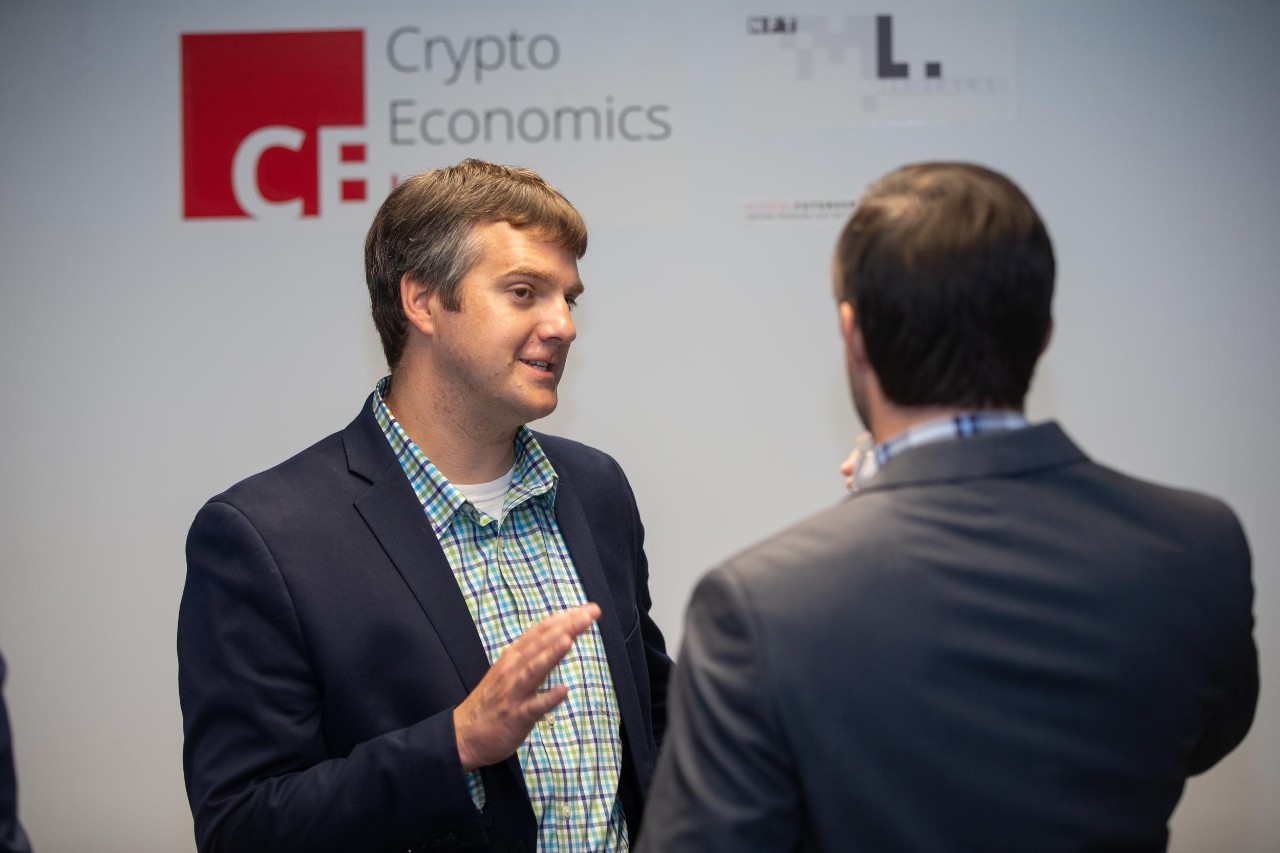
Do you understand cryptoeconomics?
UC researchers develop scale to measure individuals’ cryptoeconomics literacy
Financial literacy is imperative to improving financial decision making and increasing financial empowerment, University of Cincinnati researchers said, and they’ve developed a scale specifically to measure literacy in the cryptoeconomics sector.
While there’s a temptation to think cryptoeconomics literacy is the same thing as financial literacy in general, higher levels of financial literacy may not always result in better decisions regarding cryptocurrency investments, the UC researchers found. Some main reasons for the lack of correlation is the decentralized nature of cryptocurrencies, with fewer laws and regulations for cryptocurrencies compared to the traditional financial sector and a misunderstanding of who controls digital assets in the cryptocurrency space.

Michael Jones, PhD, director of the Cryptoeconomics Lab at UC Digital Futures. Photo/Andrew Higley/UC Marketing + Brand
“People can be misled into thinking their knowledge of finance translates really well to their knowledge of crypto,” said Michael Jones, PhD, Carl H. Lindner College of Business assistant professor of economics and director of the Cryptoeconomics Lab at UC Digital Futures.
To better understand individuals’ cryptoeconomics literacy, Jones developed a scale along with Binny Samuel, PhD, an associate professor in the Lindner College of Business’ Department of Operations, Business Analytics and Information Systems, and Truong “Jack” Luu, a doctoral student and Cryptoeconomics Lab research fellow.
Similar work has helped improve literacy in the traditional financial sectors, but there previously wasn’t a corresponding scale to measure literacy specifically in cryptoeconomics.
The researchers hope their new scale will help individuals better understand their knowledge of cryptoeconomics, help organizations measure the effectiveness of their cryptoeconomics education programs and curriculum and aid government agencies in introducing regulations.
“We saw after the Great Recession in 2008 that a lot of consumers made really poor financial decisions,” Jones said. “They didn’t understand interest rates. They didn’t understand budgeting. One of the things that came out of the Great Recession was states introducing financial literacy programs. Financial literacy really took off, and it really helped. During the most recent recession, we saw that there were not nearly the same types of bad decisions that consumers make. They didn’t load up their credit cards. They didn’t have the same amount of debt in housing.”
Need for more education

Truong “Jack” Luu, Cryptoeconomics Lab research fellow. Photo provided
While financial literacy has improved overall, there’s still a need for greater education in the cryptoeconomics space, Jones said.
In the past two years, 10% to 15% of UC students lost funds in part because they don’t understand how cryptocurrencies work, the UC researchers found.
To understand cryptocurrencies, individuals need knowledge in multiple areas.
An important thing to understand is the technical aspects such as how the cryptocurrencies are designed, how they’re stored, how owners can keep their assets safe and how to make transactions with their cryptocurrency. Each cryptocurrency has its own policies and governance structures, and there’s no central bank to regulate them.
Even people who aren’t interested in purchasing cryptocurrencies should maintain some knowledge about them, Luu said, as some scammers will direct their victims to purchase cryptocurrencies.
“You have to have awareness because we are living in the 21st century where scams, not just crypto scams, are everywhere,” the third-year doctoral candidate said. “It doesn't matter if you're involved with crypto or not, you have to be aware of what is going on around you.”
Beyond the technical knowledge, people also need to understand the economics of cryptocurrencies. Economics knowledge can help people avoid poor decisions when making cryptocurrency investments.
The scale created by the UC researchers measures individuals’ knowledge in both the technical and economic aspects of cryptocurrency.
“We wanted to focus on technical and security understanding because until that gets resolved, cryptocurrency adoption is going to be slow to take hold,” Jones said.
Test your cryptoeconomics knowledge
How knowledgeable are you about cryptoeconomics? Take the survey to find out.
Cryptocurrency as an investment
More than 90% of cryptocurrency owners keep it as an investment, the UC researchers found, while less than 20% use it as a form of payment.
Cryptocurrencies exhibit a low correlation with some traditional asset classes, such as stocks, thus making them an attractive option for portfolio diversification for investors.
For non-owners of cryptocurrency, a lack of knowledge is their top reason for not owning cryptocurrencies.
Jones said it’s important for individuals to familiarize themselves with cryptocurrencies as they’re likely going to gain more mainstream usage. Brokerage firms such as Fidelity now allow their customers to purchase cryptocurrency, and PayPal launched its own stablecoin, a type of cryptocurrency tied to the value of the U.S. dollar, in August.
“As you start to see it as an option, it’s important to familiarize yourself with what it is, how it acts as an asset, does it supplement your investment portfolio, do you replace some of the current assets in your portfolio,” Jones said.

Michael Jones, PhD, director of the Cryptoeconomics Lab, speaks to guests during the grand opening of UC Digital Futures. Andrew Higley/UC Marketing + Brand
Resources for individuals
To better educate people about cryptocurrency, the researchers said more programs are needed. Seventeen states require high school students to complete financial literacy courses, and Jones thinks incorporating cryptocurrency education into that curriculum would be helpful.
“A lot of people come into crypto because they want to be rich, they want to make money, and we want to make sure that they understand what they are dealing with,” Luu said.
Education programs could help prevent losses that cryptocurrency owners have suffered in recent years, similar to how traditional financial literacy programs have helped in the wider financial sector.
“We’re hoping by developing this scale, it’s going to allow for the creation of this curriculum. We can put it in high schools, and we can measure if it’s effective in increasing these students’ understanding,” Jones said.
Colleges already are developing cryptoeconomics curriculum. UC offers a professional certificate in blockchain fundamentals. Jones is teaching a cryptoeconomics class this fall, and UC’s colleges of Law and Engineering also offer courses in blockchain, a digital ledger where cryptocurrencies transactions are recorded.
“At UC, we’re pretty ahead of the game by offering the classes that we do and the certificate, but there’s still a long way to go,” Jones said.
For people who don’t study cryptoeconomics in college, Jones said, financial services companies that sell cryptocurrencies offer educational resources for their customers.
“Platforms want educated users,” Jones said. “They want their customers to make better decisions because if they make better decisions, they’re more likely to stick with the platform.”
Sharing the knowledge
The survey created by the UC researchers is available for any institution to use for free to measure the cryptoeconomics knowledge of their clients or population base. They’ve had some conversations with organizations about using it.
They also plan to translate their survey into multiple languages so it could be used globally.
Featured image at top: Cryptocurrency coins. Photo/Kanchanara on Unsplash
Impact Lives Here
The University of Cincinnati is leading public urban universities into a new era of innovation and impact. Our faculty, staff and students are saving lives, changing outcomes and bending the future in our city's direction. Next Lives Here.
Related Stories
Prestigious green and gold accolades highlight UC Earth Day 2021
April 19, 2021
There’s no making light of the ‘Gold’ accolade recently earned by the University of Cincinnati’s Carl H. Lindner College of Business’ new home on campus.
Protect Company Assets by Mitigating Cyber Risks
April 8, 2021
Cyber threats and insurance have become a ubiquitous business issue. Insurance is intended as a vehicle to transfer catastrophic risk to carriers contractually in consideration for premium dollars. There is no coverage area where the risks evolve more rapidly than cyber, and so the insurance must evolve with it.
Tactical Treasury: Fraud prevention is a never-ending task
April 8, 2021
With Nacha rule changes coming in 2021, along with new treasury solutions that are advancing and adapting to a world with more ACH transactions, it’s important to understand how to follow them and mitigate fraud.
Unlocking Your Company’s Value
April 8, 2021
The COVID-19 pandemic has forced businesses to adjust the way they operate. We now meet virtually, find new ways to engage with our employees, and rethink the way we do business. It has been a year of transition as our companies are adapting to a new normal, and it is the perfect time to unlock and discover new value opportunities in your organization.
Protect Yourself With Thoughtful Estate Planning
April 8, 2021
Now is a good time to review personal and family estate planning. Many new opportunities are developing considering the rising optimism with the broader economy, the new administration, and the new Congress. Although the future remains uncertain, there are many things that can be done in the present to protect the interests of your loved ones and yourself.
UC Foundation Board of Trustees elects six new members
May 11, 2021
The University of Cincinnati Foundation Board of Trustees has elected six new trustees to its 52-member board: Paul D. Green, BBA ’90; Lourdes J. Harshe, BBA ’92; Anndréa M. Moore, BBA’10; Arun C. Murthy, BBA ’95; Kirk L. Perry, BBA ’90, HON ‘15; and Christopher J. Van Pelt, BA ’91, MA ’93.
Passing the Baton
August 10, 2021
The past several years have engendered an unprecedented environment for family businesses. When faced with these market pressures, how does a successful family business enterprise respond? What is “success” in a climate like this — and how does succession come into play?
UC Lindner College of Business Maintains Prestigious Business School Accreditation
February 10, 2016
AACSB once again deems college a distinguished hallmark of excellence in business education.
Lindner MBA Program Earns Nation s Biggest Three-year Rankings Jump in U.S. News & World Report
March 16, 2016
Lindner Full-Time MBA Program Up 36 Spots and Part-Time MBA Up 69 Spots Since 2014 Rankings.
UC Center for Professional Selling Named a 'Top University Sales Program' in North America
April 27, 2017
The Sales Education Foundation recognized the Carl H. Lindner College of Business program for helping to prepare students for successful careers in professional selling.
